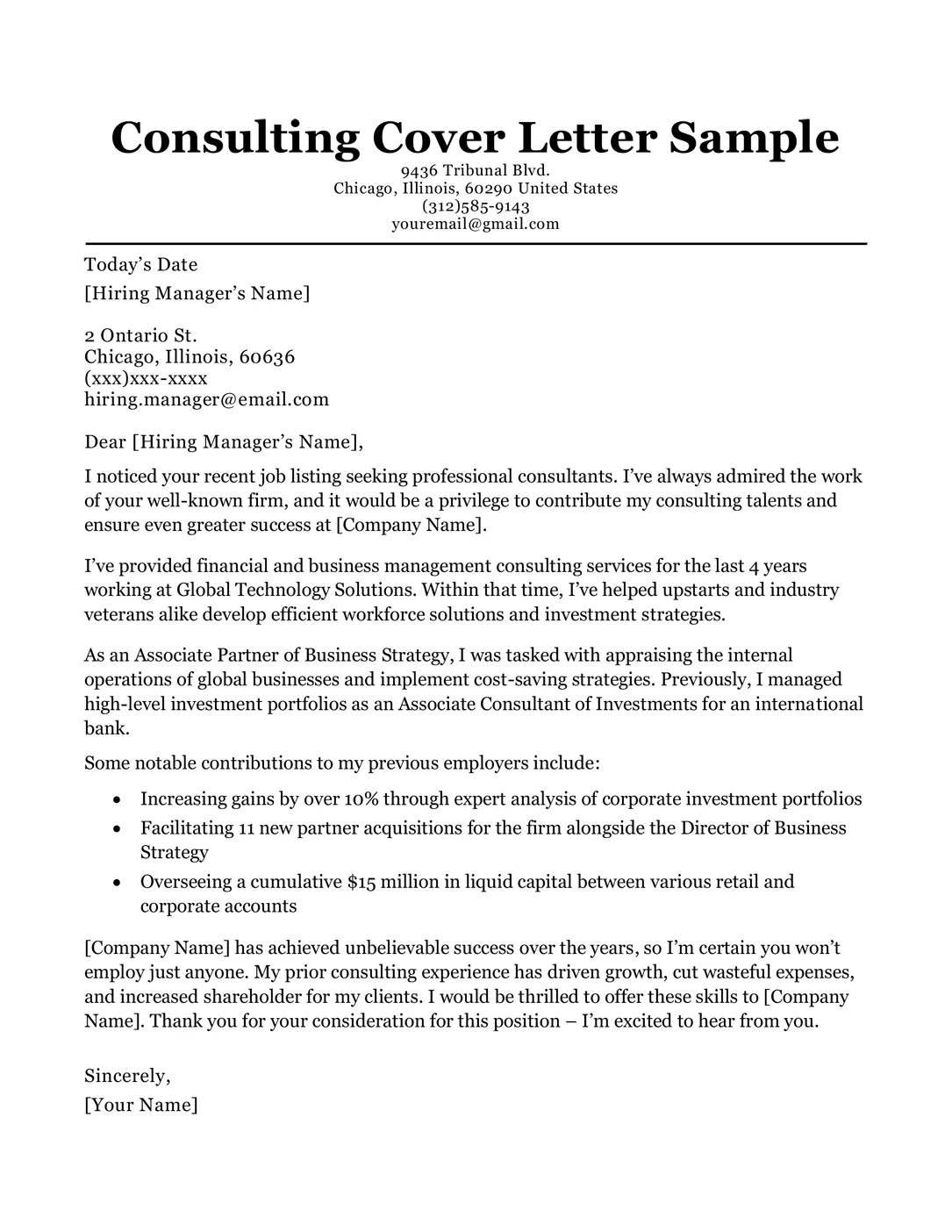Understanding the Consulting Cover Letter
A consulting cover letter is your first chance to make a lasting impression on potential employers. It’s a critical document that complements your resume, showcasing your skills, experience, and personality in a compelling manner. Unlike a resume, which provides a factual overview of your career, a cover letter allows you to tell a story, explaining why you’re the perfect fit for the consulting role and the specific firm. It’s your opportunity to articulate your understanding of the consulting industry, the firm’s values, and how you can contribute to their success. A well-crafted cover letter can significantly increase your chances of securing an interview and ultimately landing your dream job in the consulting world. It is important to remember that the cover letter should be tailored to each specific job application and the company you are applying to, not a generic template.
Key Components of a Consulting Cover Letter
A strong consulting cover letter includes several essential components that work together to create a persuasive narrative. These elements include clear contact information, a professional greeting, a concise summary of your relevant experience, quantifiable achievements that demonstrate your impact, evidence of your consulting skills, a tailored approach to the specific firm, and a strong closing with a call to action. Each section plays a vital role in demonstrating your qualifications and suitability for the role. By carefully crafting each of these components, you can create a cover letter that grabs the reader’s attention and highlights your unique value proposition. Remember to maintain a professional tone throughout the letter, showcasing your communication skills and attention to detail.
Contact Information
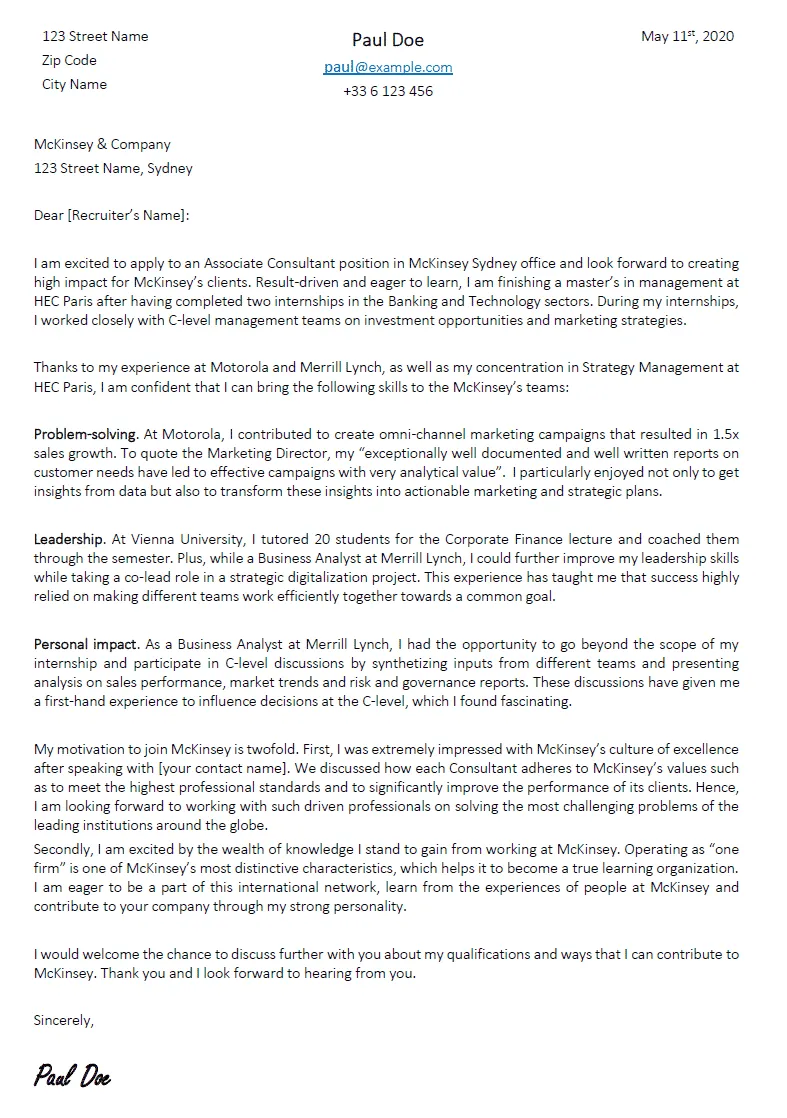
At the top of your cover letter, include your full name, address, phone number, and professional email address. Make sure your email address sounds professional. It’s the first thing a potential employer sees, so accuracy and professionalism are key. This information ensures the recruiter can easily contact you for an interview or further communication. Double-check that all the information is accurate and up-to-date to avoid any communication issues. This part seems small but can make the recruiter immediately discard your application if it is inaccurate or hard to understand.
Professional Greeting
Address the hiring manager or the specific person mentioned in the job posting. If you cannot find a specific name, use a professional greeting like ‘Dear Hiring Manager’ or ‘Dear [Department Name] Team.’ Avoid generic greetings such as ‘To Whom It May Concern’ as they can make your letter seem impersonal. Personalizing your greeting shows that you’ve taken the time to research the company and the role. It helps establish a connection with the reader from the start, increasing the chances that they will read the whole letter with interest. This small gesture can make a big difference in setting a positive tone.
Highlighting Relevant Experience
In the body of your cover letter, briefly summarize your relevant experience. Focus on experiences that align with the consulting role you are applying for. Highlight your key responsibilities, projects, and achievements. Tailor this section to match the specific requirements outlined in the job description, emphasizing how your experience has prepared you for the position. Use strong action verbs to describe your accomplishments and skills. For example, instead of saying, ‘I was involved in a project,’ you might say, ‘I led a team that successfully implemented a new marketing strategy.’ Be clear, concise, and demonstrate your understanding of the consulting industry.
Quantifiable Achievements
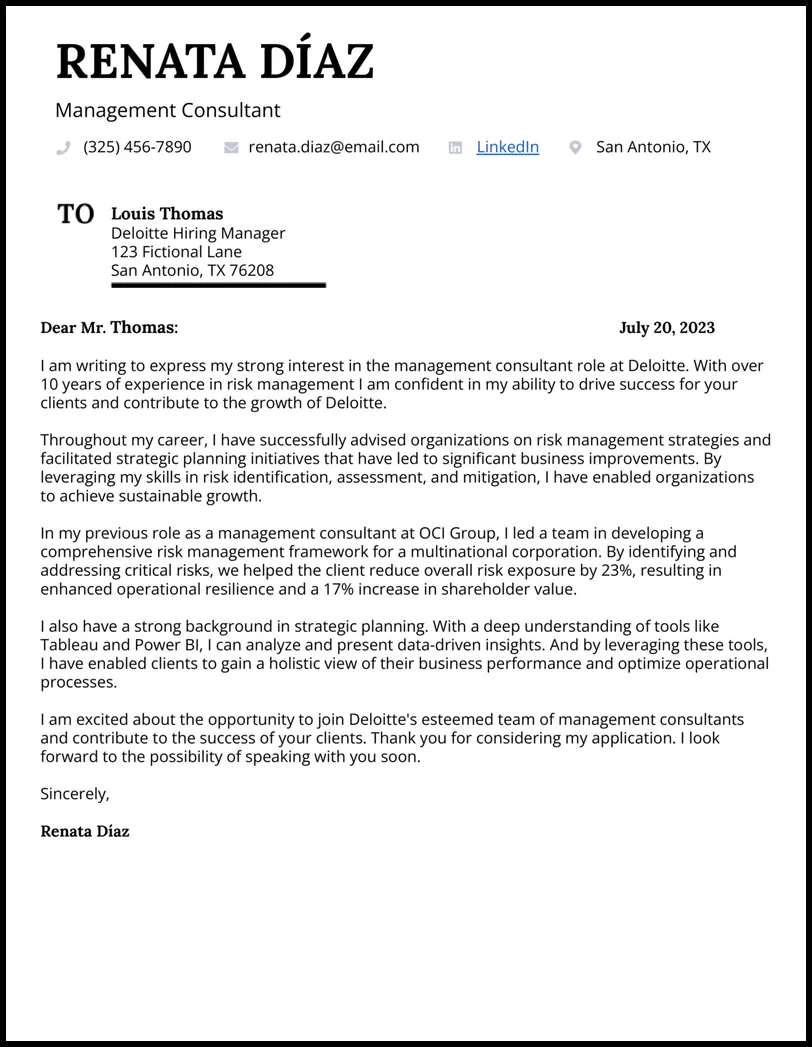
Provide specific, quantifiable achievements to demonstrate the impact of your work. Use numbers, percentages, and data to showcase your accomplishments. For example, instead of saying, ‘I improved sales,’ state, ‘I increased sales by 15% in one quarter.’ Quantifiable achievements provide concrete evidence of your abilities and make your accomplishments more compelling. They show potential employers the tangible results you can deliver. This approach helps recruiters understand the value you can bring to their company. Always use metrics relevant to the specific consulting role and the company’s goals.
Demonstrating Consulting Skills
Consulting roles require specific skills. Your cover letter should showcase your proficiency in these areas. Highlight skills like problem-solving, analytical thinking, communication, and teamwork. Provide specific examples of how you’ve used these skills in previous roles or projects. For instance, describe a situation where you identified a critical problem, analyzed the situation, and developed a successful solution. Use the job description to identify the key skills the company is looking for and tailor your examples accordingly. This section is about showing, not just telling, the employer that you have what it takes to succeed as a consultant.
Problem-solving abilities
Consultants are hired to solve complex business problems. In your cover letter, demonstrate your ability to identify, analyze, and solve problems. Describe specific instances where you faced a challenging situation and how you approached it. Outline the steps you took, the tools or methods you used, and the results you achieved. Focus on how you applied critical thinking, gathered relevant information, and developed innovative solutions. Show your ability to break down complex problems into manageable components, analyze data, and propose effective recommendations. The ability to solve problems is fundamental to success in consulting, and this section of your cover letter is critical.
Communication and Teamwork
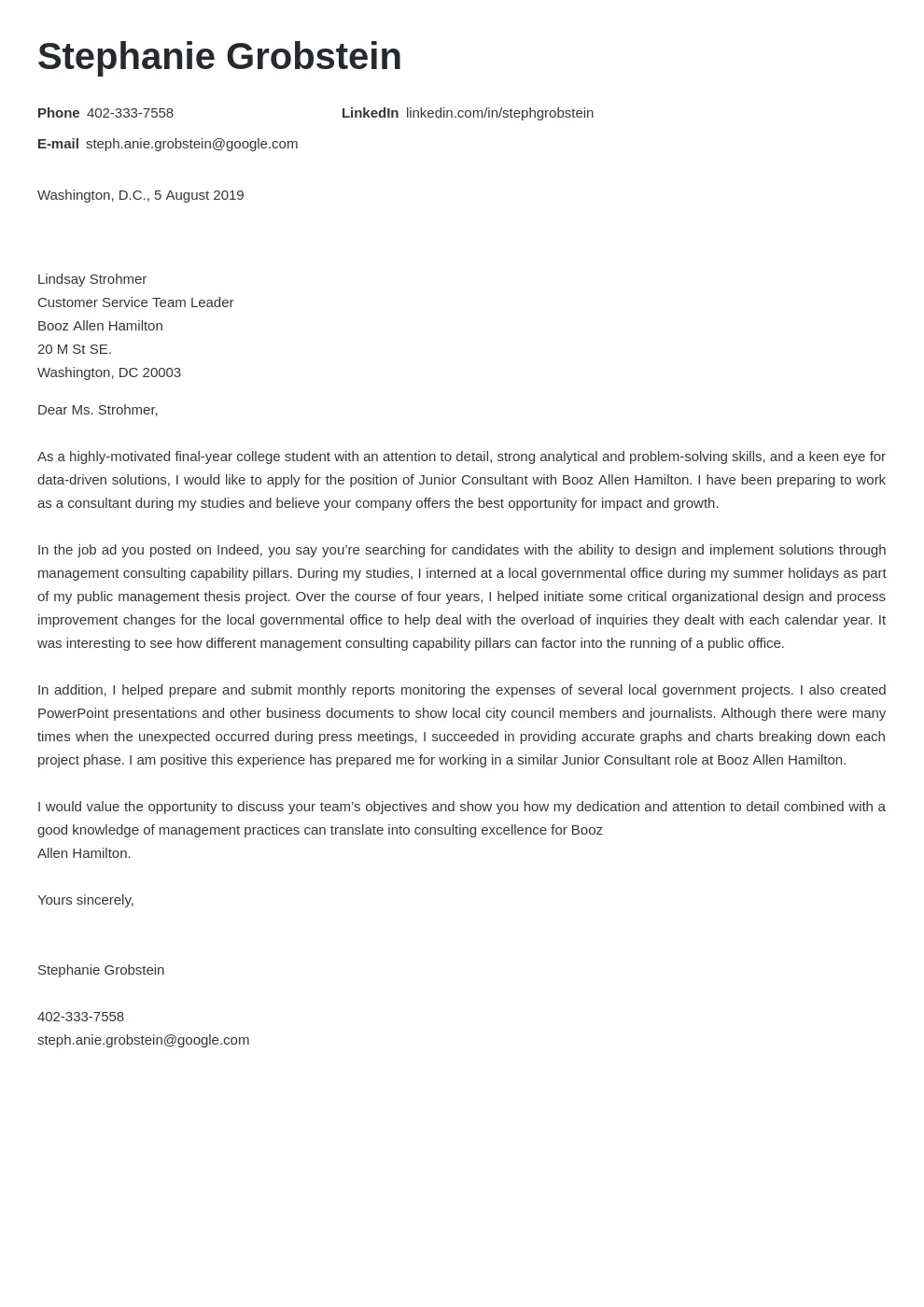
Consulting heavily relies on effective communication and teamwork. Show your ability to communicate clearly and persuasively, both verbally and in writing. Provide examples of how you’ve collaborated with teams, presented complex information, and built strong relationships with clients or colleagues. Highlight situations where you mediated conflicts, facilitated discussions, or led team projects to successful outcomes. Showcase your ability to listen actively, understand diverse perspectives, and work collaboratively towards shared goals. Emphasize your interpersonal skills and your capacity to work effectively in a team environment.
Tailoring to the Consulting Firm
Customize your cover letter for each consulting firm you apply to. Show that you understand the firm’s values, mission, and specific needs. Highlight how your skills and experience align with their unique approach to consulting. Research the firm’s clients, projects, and industry focus. Demonstrate your genuine interest in the company and the role, emphasizing how you can contribute to their success. Tailoring your letter shows that you have taken the time to understand the company and are genuinely interested in working there. It shows that you are not just sending a generic application.
Researching the Company
Before writing your cover letter, thoroughly research the consulting firm. Visit their website, read industry publications, and follow their social media accounts. Understand their core values, areas of expertise, and recent projects. Identify any specific projects or initiatives that resonate with your skills and experience. Show that you understand their business model, clients, and industry focus. This research will help you tailor your cover letter to the specific company, demonstrating your genuine interest and understanding of their needs. Mentioning specific projects or values in your cover letter can also make your application more memorable.
Addressing the Job Requirements
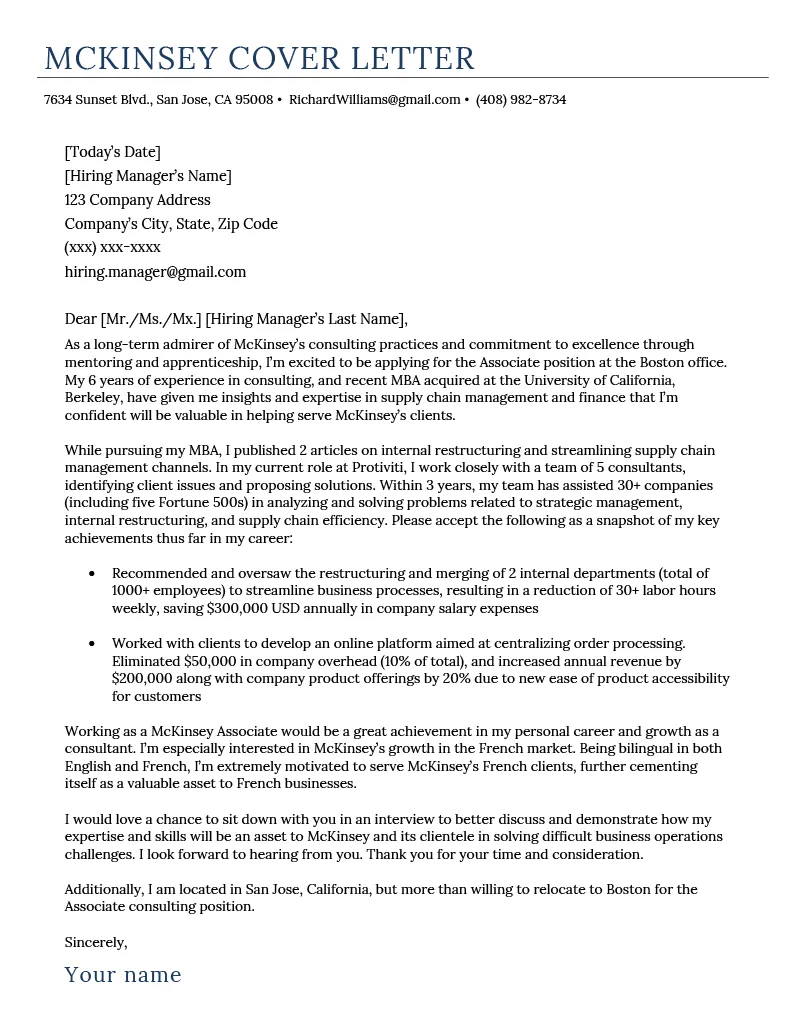
Carefully review the job description and address each of the required skills and qualifications in your cover letter. Align your experience and skills with the specific requirements outlined in the job posting. Use the same keywords and phrases used in the job description where appropriate, but do so naturally and without keyword stuffing. Explain how your previous experiences have prepared you to meet the needs of the role. By clearly demonstrating your ability to fulfill the job requirements, you show the hiring manager that you are a strong candidate for the position.
The Closing and Call to Action
End your cover letter with a strong closing statement that summarizes your interest in the role and the company. Express your enthusiasm for the opportunity and reiterate your key qualifications. Include a clear call to action, such as requesting an interview or expressing your willingness to provide further information. Thank the reader for their time and consideration. A strong closing leaves a lasting positive impression. It should reflect confidence, enthusiasm, and a clear understanding of the role and the company’s needs.
Expressing Enthusiasm and Gratitude
Reiterate your enthusiasm for the consulting role and the firm. Express your gratitude for the reader’s time and consideration. Show that you are excited about the opportunity to contribute to the company’s success and learn more about the position. A sincere expression of enthusiasm and gratitude can make your cover letter more memorable and leave a positive impression on the hiring manager. End with a professional closing such as ‘Sincerely’ or ‘Best regards,’ followed by your typed name.
Following Up
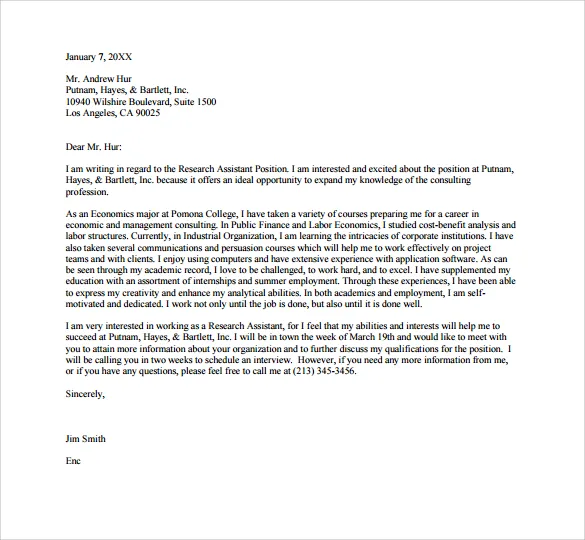
After submitting your cover letter and resume, it’s often appropriate to follow up with the hiring manager or recruiter. Send a brief email or make a phone call a week or two after the application deadline. This shows your continued interest in the role and allows you to reiterate your qualifications. In your follow-up, briefly mention your interest in the position and reference your cover letter and resume. Keep it concise and professional. Following up demonstrates your proactive approach and can help you stay top-of-mind during the selection process. However, be mindful not to be overly persistent, and respect the hiring manager’s time.
